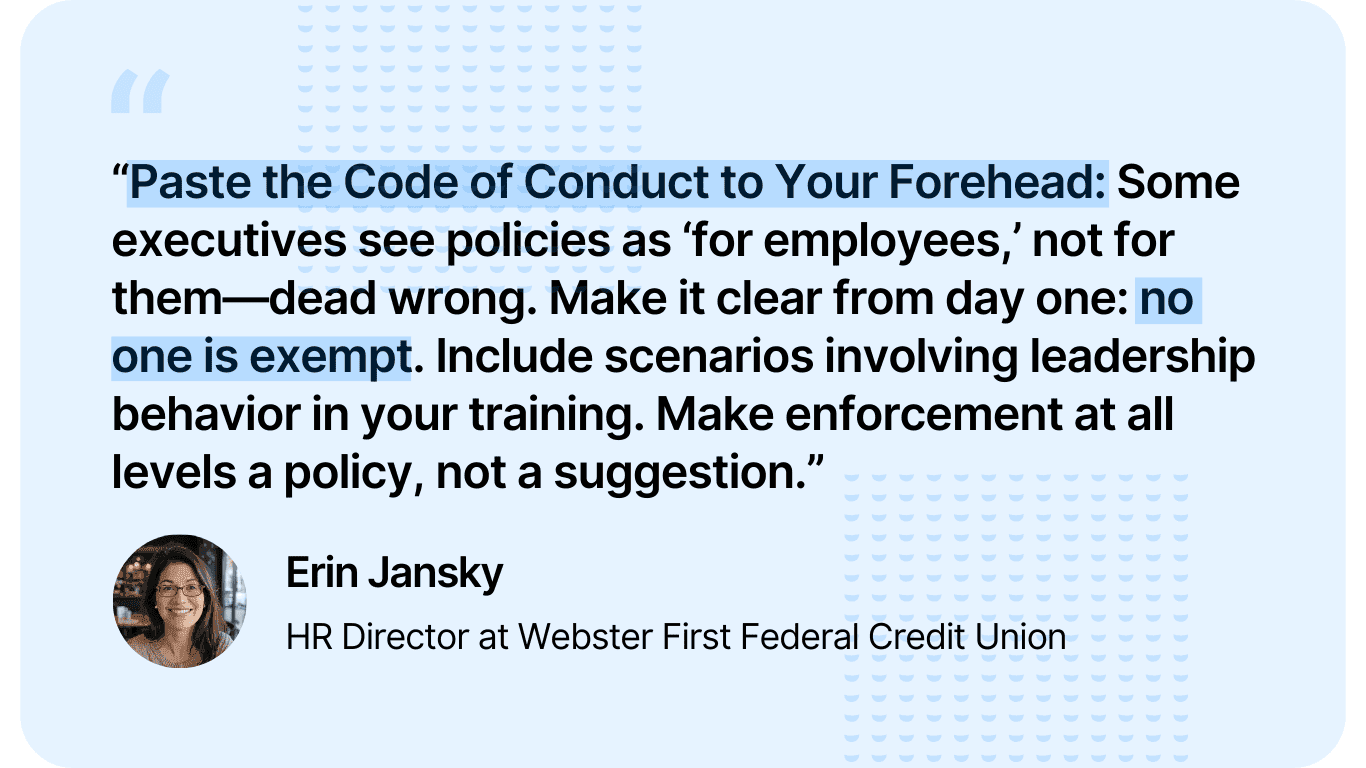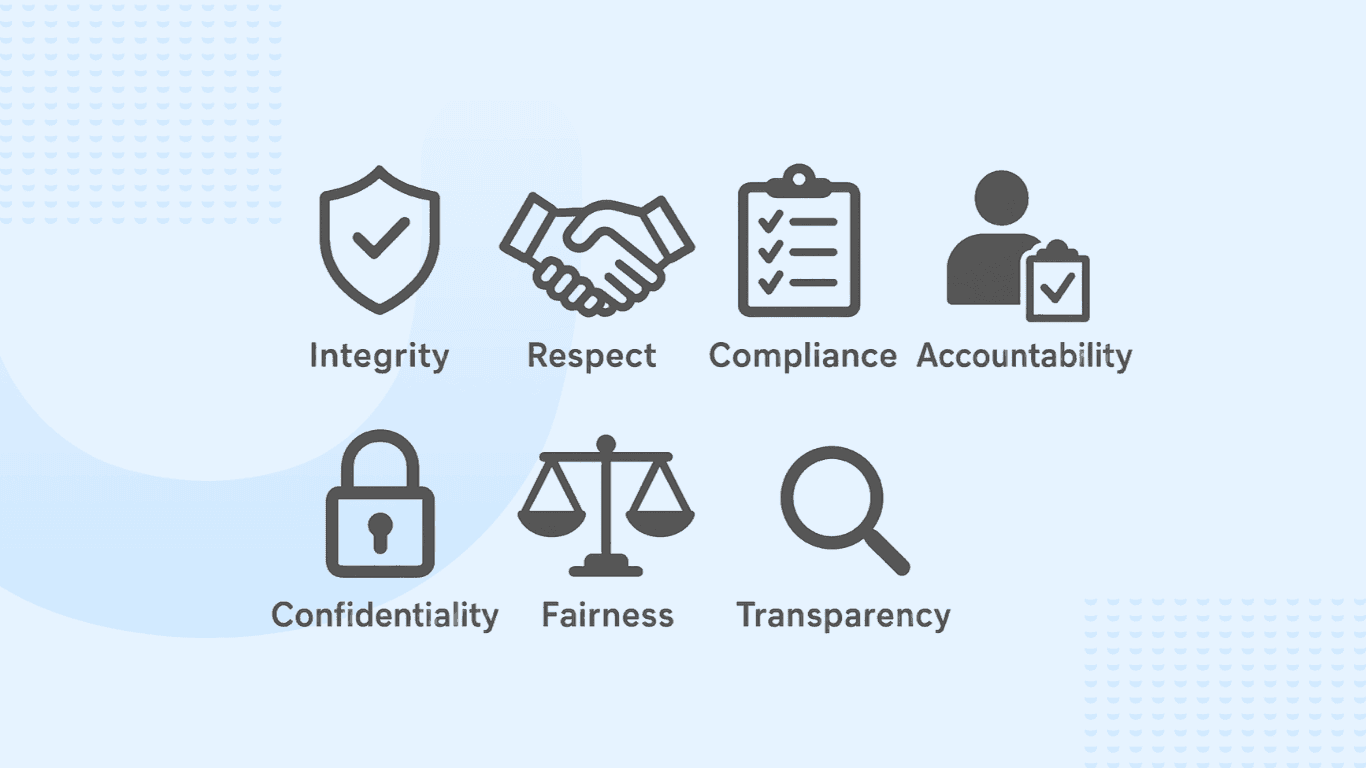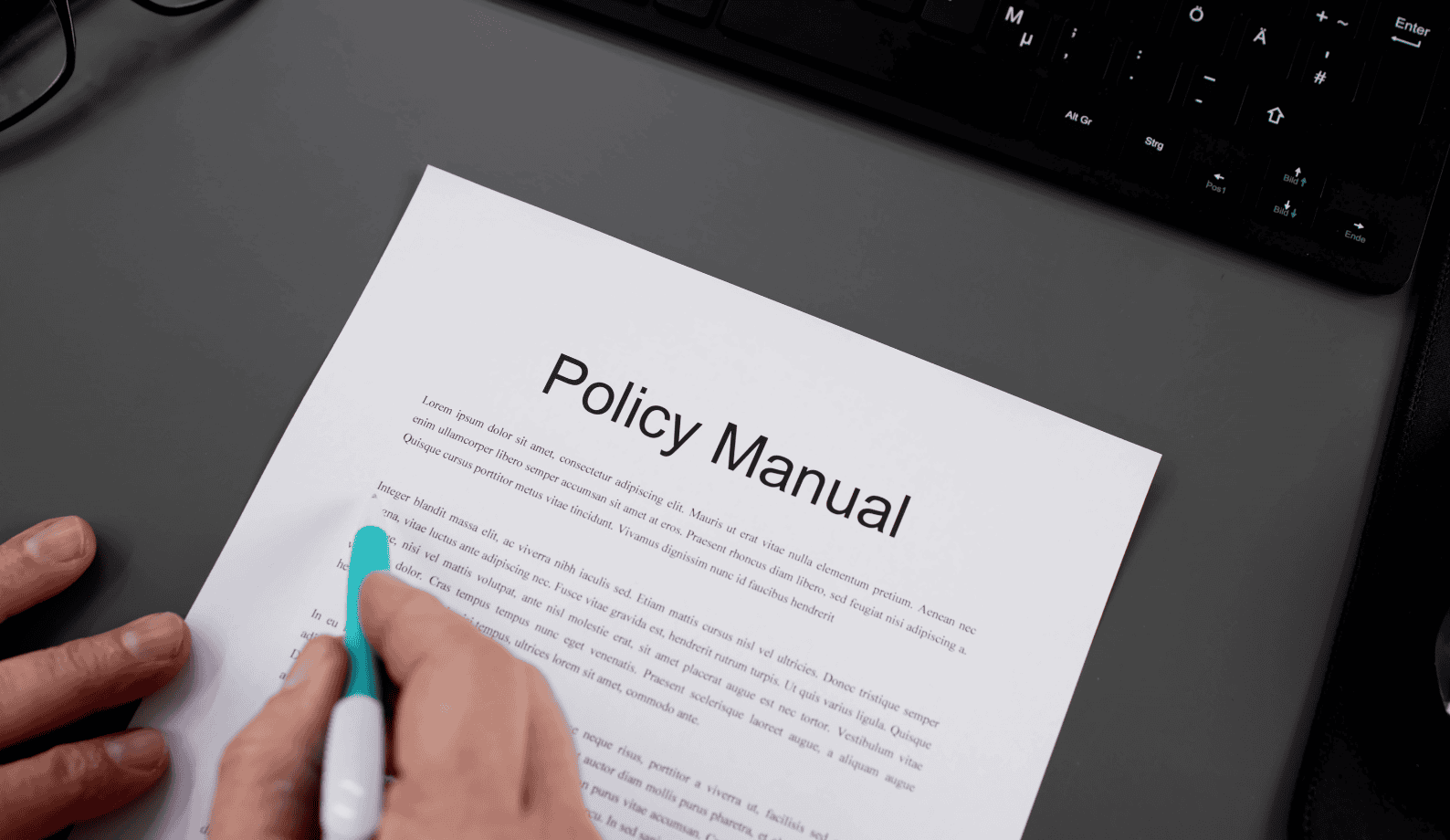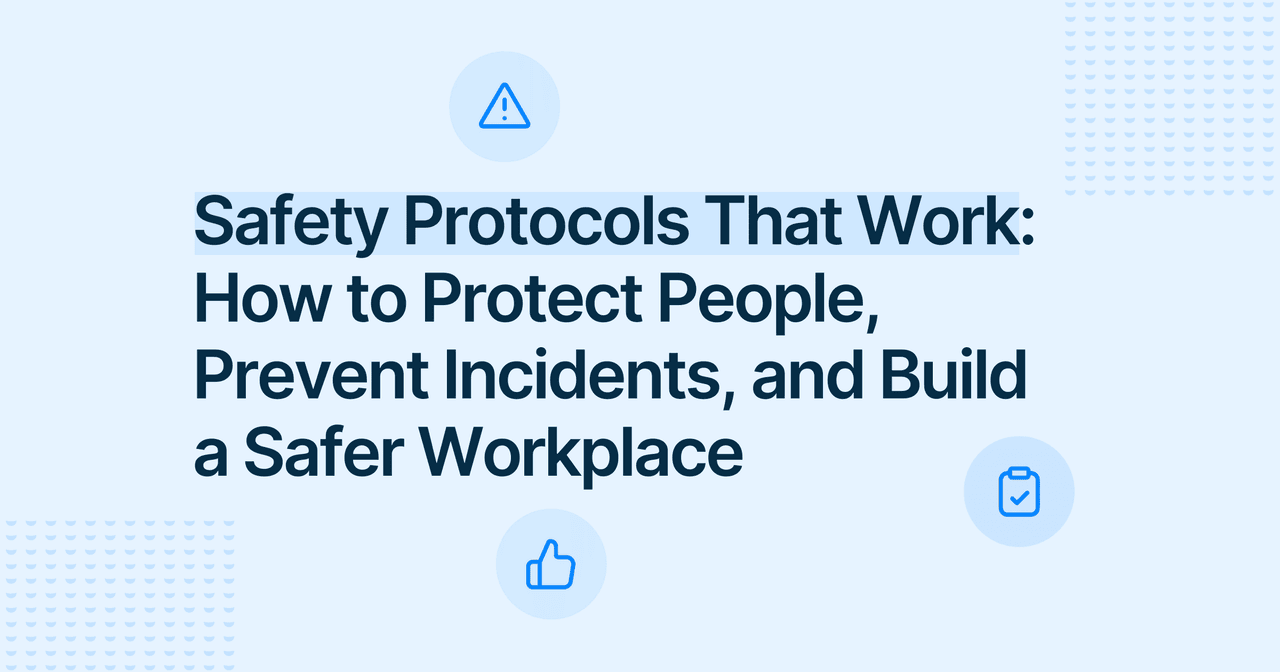



Bring All Confidential Reports Into One Secure Place
We’ll assess your needs and recommend the right setup for anonymous reporting or surveys - aligned with your compliance or HR goals.
Legal & Compliance

Alaa El-Shaarawi
Copywriter and Content Manager
Published
2025-09-23
Reading time
9 min


Table of contents
Subscribe to our newsletter
Imagine your company as a thriving city. What keeps it running smoothly isn’t just infrastructure or the economy; it’s the shared rules and social contract that keep neighbors respectful, streets safe, and businesses trustworthy. In the workplace, that shared contract is your company code of conduct policy.
A company code of conduct isn't just a dusty manual buried on the intranet. It’s the heartbeat of your organization’s ethics, culture, and identity.
For HR professionals, compliance officers, and business leaders, creating a code of conduct for a company that’s clear, practical, and enforceable is essential.
Tools like FaceUp Whistleblowing & Compliance make sure your code of conduct is applied consistently, keeping teams aligned with laws, regulations, and internal policies.

A company code of conduct is your organization’s playbook of expected behaviors, ethical standards, and legal compliance rules that guide everyone, from new hires to the C-suite.
Think of it as part roadmap, part compass. It sets clear boundaries while pointing employees towards the company’s true north: its core values and principles.
But how is this different from a code of ethics?
It also translates laws, regulations, and internal policies into practical actions employees can follow, keeping the company ethical, compliant, and lowering risk.
This turns broad ideas like “integrity” and “respect” into real-world guidance: “Here’s how to treat colleagues,” “Here’s what to do if you spot a conflict of interest.”
Only ~50% of top companies have an effective code of conduct, meaning many remain exposed to compliance issues and cultural risks.
A strong code turns values into action and helps employees navigate tricky situations. Learn more in our guide on conflict of interest in the workplace.
Why do companies have a code of conduct? Beyond legal protection, a clear company code of conduct and ethics shapes expectations and employee behavior, providing the standards that protect your company’s culture, reputation, and people.
Confusion is expensive. It leads to mistakes, miscommunication, and compliance risks. A well-written code makes expectations crystal clear, protecting your organization and its long-term success.
Every culture has its own norms and communication styles. A code of conduct sets the rules that allow people to express themselves while keeping the workplace respectful.
This is especially important for younger employees: over the last five years, 52% of Gen Z employees reported witnessing workplace harassment, compared to 33% of Boomers.
A clear, shared framework helps prevent such misconduct and aligns expectations across diverse teams.
A clear, enforceable company policy and code of conduct doesn’t just protect you legally. It sets the tone for how your team behaves.
Guidelines on harassment, confidentiality, conflicts of interest, and compliance are both your safety net and your ethical compass. They reinforce responsible employee behavior company-wide.
When expectations are clear, employees make better decisions and leaders stay accountable. That’s what separates box-ticking compliance from building a proactive, values-driven culture.
But a policy alone isn’t enough:
Tools like FaceUp Whistleblowing & Compliance help embed these protections by providing safe, anonymous reporting channels and ensuring leadership can respond effectively, so your policy actually works in practice.
Ethical behavior starts at the top. When leaders model policies consistently, employees follow, and the culture thrives.
Companies with strong ethical leadership see up to 50% fewer misconduct reports, showing how critical leadership is in turning rules into real-world behavior.

Want to see how good leadership works in practice? Take a look at our guide on leading ethically.
A clear, authentic code of conduct helps employees feel safe, respected, and heard. This trust drives engagement, loyalty, and strengthens your brand.
Organizations with highly engaged employees outperform peers by 21% in profitability, demonstrating the tangible business value of a culture built on clear conduct.
So for any organization looking to build a strong ethical foundation, the importance of code of conduct in companies can’t be overstated. It’s the framework that turns values into daily action and shared accountability.
Integrating training and acknowledgment tracking in one platform, like FaceUp, makes it easier for employees to internalize policies and sustain a strong workplace culture over time.
Learn more about why strong work ethics are important for your organization.

While every company’s code will look a little different, the most effective ones are built on these seven universal principles:
| Principle | Description | Example |
|---|---|---|
| Integrity | Act honestly and uphold the company’s values consistently, even when it’s difficult. | Address challenges transparently rather than covering up mistakes. Speak up when something feels wrong, even if it’s uncomfortable. |
| Respect | Treat colleagues, clients, and stakeholders with dignity, fairness, and professionalism. | Listen actively during meetings and appreciate diverse perspectives without interrupting or dismissing them. |
| Compliance | Follow all relevant laws, regulations, and company policies to protect the organization and its people. | Adhere strictly to anti-bribery laws and data privacy rules, reporting any suspicious activities. |
| Accountability | Take responsibility for your decisions and encourage others to do the same. | Own up to errors immediately and work proactively to solve problems. |
| Confidentiality | Protect sensitive information entrusted to you, preserving privacy and trust. | Do not disclose customer data, trade secrets, or employee personal details without proper authorization. |
| Fairness | Avoid discrimination, harassment, or conflicts of interest. Make decisions transparently and impartially. | Make sure hiring processes and promotions are based on merit, without favoritism or bias. |
| Transparency | Communicate openly, raise concerns responsibly, and use reporting channels without fear of retaliation. | Use anonymous whistleblowing systems to report unethical behavior and trust that management will take appropriate action. |
These principles form your company’s moral backbone. FaceUp helps embed them into daily practice with reporting, training, and accountability.
Developing a code of conduct in a company is about balancing enforceable rules with aspirational principles, legal compliance with cultural relevance, and clarity with accessibility.
Some of the most common challenges include:
Before writing, ask: what is the purpose of a company code of conduct? At its core, it's your blueprint for ethical decision-making, guiding employee behavior, and protecting your business reputation.

| Section | What to Include | Example Wording |
|---|---|---|
| Introduction & Purpose | Explain the purpose and importance of the code. | “Our Code of Conduct is designed to guide how we work together, treat one another, and represent the company.” |
| Scope | Define who the code applies to (employees, contractors, partners, etc.). | “This Code applies to all employees, contractors, and third-party partners.” |
| Core Values & Ethics | List the principles and values that guide decisions and behavior from new hires to stakeholders. | Integrity, Respect, Accountability |
| Behavioral Standards | Spell out professional conduct, expected behaviors, and prohibited actions. | “Treat colleagues fairly,” “Protect confidential information,” “Avoid conflicts of interest.” |
| Legal Compliance | Connect rules to relevant laws, regulations, and industry standards. | “Employees must comply with all applicable labor laws, data privacy regulations, anti-bribery standards, and use company assets responsibly.” |
| Reporting & Whistleblowing | Provide safe, confidential channels to raise concerns. | “Concerns can be reported anonymously through whistleblowing tools like FaceUp.” |
| Disciplinary Actions | Clarify consequences for violations. | “Breaches of this Code may result in disciplinary action, up to and including termination.” |
| Leadership Responsibilities | Highlight leaders’ role in modeling and enforcing the code. | “Managers are expected to lead by example and ensure their teams understand and follow the Code.” |
| Review Cycle | Commit to keeping the policy updated and relevant. | “This Code will be reviewed annually to reflect changes in law, culture, or company priorities.” |
Policies only work if they’re lived. Without support, even the best code of conduct risks being ignored.
FaceUp helps companies bring codes to life with anonymous reporting, compliance tracking, and feedback channels. These examples show how strong policies plus the right tools make integrity, accountability, and transparency part of everyday work.
Galeam, a security provider in Mexico, gave employees a safe, anonymous way to report misconduct. Leadership acted quickly, reducing corruption and turnover.
Cleanstar, an eco-friendly cleaner in Ecuador with 1,000+ employees, uses FaceUp to reinforce accountability and transparency. Reporting harassment, theft, and discrimination is easy, making employees feel heard and boosting workplace trust and safety.
You can do it too: FaceUp makes it easy to distribute policies, track compliance, and gather real-time feedback, so that your team not only understands your values but truly lives them.
As Galeam and Cleanstar show, a code of conduct only works if it’s kept alive. It’s not a one-time document—it must be updated regularly to reflect laws, company changes, and evolving culture. Pair updates with onboarding and refresher training so everyone stays aligned.
Enforcement works best with visible leadership commitment, consistent discipline, and easy reporting. FaceUp helps you track compliance, collect feedback, and spot risks early, keeping your code an active part of company culture.
Don’t let it gather dust in a shared folder.
Your code of conduct is what shapes trust, transparency, and how your people treat each other every day. With FaceUp, you can turn those words into action.
Build clear, living guidelines that protect your team, strengthen your culture, and keep your company’s values front and centre.
Lead with integrity. Keep compliance simple. Find your company’s true north. Try FaceUp for free today.




We’ll assess your needs and recommend the right setup for anonymous reporting or surveys - aligned with your compliance or HR goals.
Keep Reading

Alaa El-Shaarawi2026-02-108 min
Legal & Compliance

Alaa El-Shaarawi2026-02-098 min
Workplace Environment

Marie Roland2026-02-033 min
Workplace Environment

Alaa El-Shaarawi2026-02-029 min
Workplace Environment